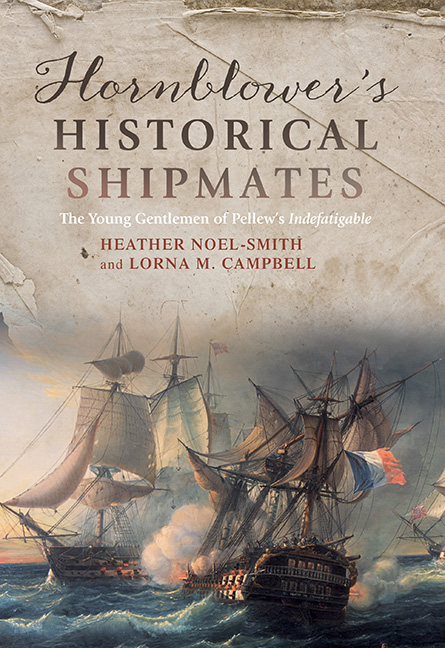Book contents
- Frontmatter
- Dedication
- Contents
- List of Illustrations
- Preface and Acknowledgements
- List of Abbreviations
- Introduction
- 1 Edward Pellew – Partisan and Patriarch
- 2 ‘My Dear Indefatigable’
- 3 The Fortunate Few
- 4 ‘Never Was Such an Action Known’
- 5 The Nature of Patronage
- 6 ‘Boys Grown to Manhood’
- 7 Diversity and Responsibility
- 8 Friends, Family and the Falmouth Connection
- 9 ‘Faithful and Attached Companions’
- 10 ‘No State in Life More Honourable’
- Appendix The Spencer–Pellew Correspondence of February 1799
- Bibliography
- Index
10 - ‘No State in Life More Honourable’
Published online by Cambridge University Press: 28 April 2017
- Frontmatter
- Dedication
- Contents
- List of Illustrations
- Preface and Acknowledgements
- List of Abbreviations
- Introduction
- 1 Edward Pellew – Partisan and Patriarch
- 2 ‘My Dear Indefatigable’
- 3 The Fortunate Few
- 4 ‘Never Was Such an Action Known’
- 5 The Nature of Patronage
- 6 ‘Boys Grown to Manhood’
- 7 Diversity and Responsibility
- 8 Friends, Family and the Falmouth Connection
- 9 ‘Faithful and Attached Companions’
- 10 ‘No State in Life More Honourable’
- Appendix The Spencer–Pellew Correspondence of February 1799
- Bibliography
- Index
Summary
One factor affecting the Indefatigables, which they shared with the majority of officers and men who served at sea during the eighteenth and nineteenth centuries, was the toll that their naval careers took on their health. In addition to those who lost their lives as a result of shipwreck, disease and wounds sustained in action, a number of them, including Nicholas Pateshall, George Cadogan, Thomas Groube and Henry Hart, suffered from health problems that resulted in them being sent ashore to recuperate for periods of weeks or months. Like many sea officers and men, many of the Indefatigables suffered from the severe rheumatic pains that frequently resulted from years spent in wet clothes and freezing conditions, as well as long-term complications brought on by the destructive nature of earlier wounds. For those that had the means, taking the waters at fashionable spas such as Cheltenham was regarded as a beneficial treatment to alleviate the arthritic and rheumatic pains that were the legacy of the tough living conditions they had endured, and which often became magnified in later life.
In the letter that William Kempthorne wrote to his friend Nicholas Pateshall in 1816 with news of the Bombardment of Algiers, he signed off with the suggestion that they meet at Cheltenham: ‘Should I spend a few weeks at Cheltenham as my side sometimes tells me I should, it will give me very much pleasure to meet you.’
Pellew himself spent time in Cheltenham in the late autumn following his return from Algiers, when he was not attending numerous engagements in London. He arrived in the town on 24 October 1816 and was welcomed in grand fashion; The Morning Post reported in great detail how his carriage was drawn into the town by a team of beribboned men, preceded by a cheering crowd who escorted him to his town house. The Post also noted: ‘We are anticipating a crowded ball on the 6th November, under the patronage of Lord and Lady Exmouth at the solicitation of all the naval officers.’ It seems quite likely that among the officers making the solicitation there were one or more former Indefatigables, perhaps even Kempthorne and Pateshall.
Cheltenham continued to be a popular retreat for naval officers throughout the 1820s and 1830s.
- Type
- Chapter
- Information
- Hornblower's Historical ShipmatesThe Young Gentlemen of Pellew's <I>Indefatigable</I>, pp. 199 - 214Publisher: Boydell & BrewerPrint publication year: 2016



